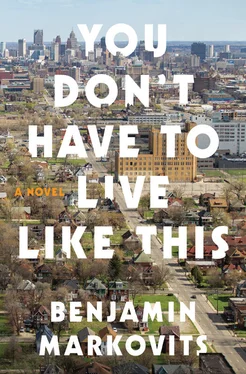“Excuse me, no. That’s like a Yalie’s point of view, because you basically trust the system. You think, all I have to do is tell the truth, so help me God. But the system doesn’t work, so it’s a question of getting from it something you can live with. I mean, what’s Nolan looking at? Life with parole. Ten years. Four years. Think about Clarence. Because whatever it is, he’ll have to live with it, too.”
“You want me to lie for him.”
“I want you to make the right thing happen.”
“That’s not my job. They’ve got judges and lawyers working this thing out.”
“You mean, the people who let Tyler Waites hit a young black man with his car . For stealing his phone .”
“I can’t talk to you when you’re like this,” I said. “You’re identifying me with people I’ve got nothing to do with.”
“These are the people asking you questions. I just want you to think very carefully about your answers.”
“I’m thinking, I’m thinking.”
“Think harder,” she said.
I told myself, this is just the friction that produces the heat. We were working out whether to align ourselves. It’s supposed to be painful, like a slipped disk — you have to learn how to move again. I said this to Gloria, too, but she wasn’t convinced.
Nolan’s trial moved from the district court to the circuit court. There was a motion hearing, to determine admissible evidence, and I went along to see what everyone had to say. The Frank Murphy Hall of Justice looks a little like a parking garage built in the 1970s, concrete with horizontal windows and those broad courthouse steps you need in the movies, to show the defendant tumbling down them into freedom or trapped halfway up by reporters.
Inside the place was done up in brown and beige. Everything was carefully coordinated, brown tables and chairs, beige walls, brown carpeting, nothing that shows stains. I guess the idea is to depress people into submission. The judge was an overweight black woman; her accent ranged from sonorous to nitpicky. A placard on the table in front of her had her name on it: Judge Liz Westinghouse. It seemed funny to me that she used her nickname — I tried to work out what that meant. Maybe her full name didn’t fit. But she had also clearly acquired what the self-improvement gurus try to sell you, strength of personality. When she came in people rose, when she sat down people sat.
Mostly what happened was procedural stuff, and not very interesting. There wasn’t much evidence in dispute. Nolan’s lawyers wanted to argue that the kid was in the street, wandering around — not in the house or the garden or the driveway. Apparently one of the cops overheard Nolan in hospital saying something about the guys working on the front gate, which seemed at least an indication of his general vicinity. But his lawyers wanted to rule these comments inadmissible — the guy had been kicked in the head, he was just waking up. There was also some dispute about whether or not the cop had read him his Miranda rights before or after Nolan said what he said or what he was alleged to have said.
I found the whole business both depressing and impressive. All this attention to detail. You realize pretty quickly that you are in the hands of massive but at the same time small-scale forces. It’s like being overrun by ants. Afterwards what you get is not facts exactly or truth or anything like that — there’s no reason to think that the real facts or the real truth is best adapted to surviving this process. I mean, I was there, I saw a lot of what happened, but I don’t know how much of what I saw or thought would have counted with these people, the lawyers. But there are certain kinds of information that do survive. It’s like those urban myths about nuclear holocaust, the only thing left is cockroaches. But that’s not quite what I mean either. There’s a kind of reproach you feel, in seeing firsthand these competent, expensively trained people do their work. Like, on what basis do I live my life? Can it withstand this kind of scrutiny? No, not really. But I also heard in the back of my mind what my brother might have said if he were watching — that some of these guys were second-rate.
Nolan was there, too. I saw his shaved head. Even he seemed cowed. Sometimes he turned and whispered something in his lawyer’s ear. And afterwards, on our way out, I caught his eye, and he gave me a look like, here we go, buddy.
A FEW DAYS LATER THE aluminum story broke in the business pages of The New York Times :
Hundreds of millions of times a day, thirsty Americans open a can of soda, beer or juice. And every time they do it, they pay a fraction of a penny more because of a shrewd maneuver by Goldman Sachs and other financial players that ultimately costs consumers billions of dollars.
The story of how this works begins in a complex of warehouses in Detroit where a Goldman subsidiary stores customers’ aluminum. Each day, a fleet of trucks shuffles 1,500-pound bars of the metal among the warehouses. Two or three times a day, sometimes more, the drivers make the same circuits. They load in one warehouse. They unload in another. And then they do it again.
This industrial dance has been choreographed by Goldman to exploit pricing regulations set up by an overseas commodities exchange, an investigation by The New York Times has found. The back-and-forth lengthens the storage time. And that adds many millions a year to the coffers of Goldman, which charges rent to store the metal.
The writer was a guy called Kocieniewski; I looked him up. A Buffalo kid, he used to work at The Detroit News . Most of his article was about the London Metal Exchange, its corporate structure (Goldman used to be on the board), and the protocols for storing precious metals. “Industry rules require that metal cannot simply sit in a warehouse forever,” Kocieniewski wrote. “At least 3,000 tons must be moved out each day. But most of the metal stored in Detroit is not being delivered to customers; instead, it is shuttled from one warehouse to another.”
Two days later someone at the National desk picked up the story and connected it to Robert James. The headline was gently tongue-in-cheek: “Detroit Scheme Makes Profit, by Sitting on Its Assets.”
Robert James describes it as the “Groupon model” for gentrification. “We take a virtual community and make it real,” he said last year at the shiny new Wayne Conner Server Farm, at a fund-raiser attended by President Obama. There were questions from the beginning about how the economics stacked up, but now it appears that Goldman Sachs, one of James’s “team of investors,” has been buying warehouses in the developed neighborhoods to store aluminum. .
So Steve Zipp was right. Maybe he was crazy but he was right. Then Time magazine ran an article on us, “Utopian Vision Faces Real-world Politics and Problems,” which covered not only the aluminum scandal but also the Meacher incident and Nolan’s trial. The journalist wanted to know whether the Goldman deal was funding the neighborhood project or whether the neighborhoods were just window dressing for a commodities scam. Beatrice didn’t worry much about the difference — the article quoted her. “This maybe matters to you people,” she said, “but I don’t have time for philosophical distinctions. We’re trying to do something good here. If Goldman broke the law, then the law should step in. Otherwise, I don’t see what the problem is.”
The problem was, as she explained to me herself one afternoon, that regulators planned to change the law and close one of the loopholes — three thousand tons turns out to be a pretty low minimum for the amount of metal warehouses have to shift each day. “Goldman’s one of our biggest investors,” she told me. “If they lose their financial incentive, we’re screwed.”
Читать дальше












